Bach sets Goethe's 'Faust' to music

Johann Sebastian Bach died on July 28, 1750, in Leipzig; Johann Wolfgang von Goethe was born on August 28, 1749, in Frankfurt. For eleven months, these two giants were, therefore, strict contemporaries. In 1775, the writer settled in Weimar, where the composer had also worked between 1708 and 1714 for the grandfather of the duke who would later attract Goethe to his court. This year, therefore, marks the 250th anniversary of that crucial event, which Weimar is celebrating in 2025 by declaring Faust the theme of the year and transforming the city into a " Faust workshop." Before that, the writer had studied law in nearby Leipzig, which is also proud to have welcomed him into its fold and commemorates him in its very center with a statue erected in front of the Old Stock Exchange building. Very close to it, Goethe used to frequent the famous Auerbach tavern with his friends, which is celebrating its fifth centenary this year. In memory of his student years, the writer placed here, which already featured 17th-century paintings in which the legendary Doctor Faustus appeared flying atop a wine barrel. This scene is almost Goliardic in character and is full of crude and ribald humor, including songs.
From the confluence of all this information arose the idea of staging the first part of Faust this year in the tavern itself. And within the framework of the Bach Festival, who else could have written the music? Prima facie , no one would associate Goethe's tragedy with the music of the composer of the Mass in B minor , and yet, the ever-voiced mind of Michael Maul , the festival's artistic director, has managed to ensure that the latter perfectly "comments on and accompanies" (his own words) the former. The task cannot have been easy, since, first of all, it was necessary to select which parts of the text to keep and which, albeit painfully, to discard: the first performance of just six scenes (without the two Prologues and Walpurgis Night , for example), in Braunschweig in 1829, lasted three and a half hours. And something similar has been done now, reducing the cast of characters to the three main ones: Faust (Burghart Klaubner), Mephistopheles (Frank Arnold) and Margarita (Lea Ruckpaul). For obvious reasons, the cuts have been much more moderate in the scene in Auerbach's tavern, in which three of the singers (Viola Blache, Daniel Johannsen and Felix Schwandtke) embody Faust's friends (entrusting the soprano with the role of Siebel: a brief Hosenrolle , as Gounod did in his opera Faust ). But everything essential from the first part, with its philosophical and theological aspects, the pact with Mephistopheles, the seduction, the filicide and the subsequent condemnation of Margarita, are, of course, present.
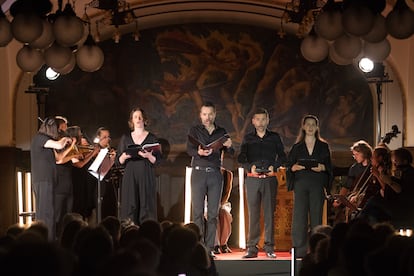
And how does Bach's music fit in here? There are cases where the connection is almost given by the text. At the end of the first scene, for example, the Easter Sunday bells ring, dissuading Faust from ingesting the poison with which he was about to end his life. And precisely at that moment, the first chorus of Cantata BWV 4, Christ lag in Todesbanden (to be performed on Easter Sunday), sounds. The symphony of this cantata had already been heard shortly before, in the middle of Faust's monologue, almost like a premonition. Even earlier, at the very beginning of the performance, the musicians had played the opening symphony of Cantata BWV 152, from Bach's Weimar years, whose first aria begins significantly with the text "Go forward on the path of faith." And as a prologue to Faust's famous monologue, we hear the first verse of the concluding chorale of Cantata BWV 178, from the Leipzig cycle of chorale cantatas, one of whose lines reads: "Reason fights against faith." Many of the connections are, of course, very subtle, but they are subtle, and they create a novel framework for the development of the tragedy.
The music sometimes prepares for the arrival of the text, other times glosses it, and in some cases, overlaps it. Maul wisely abandons the diegetic approach and uses Bach's music to adapt it to the texts Goethe intended to be sung. He therefore discards the rat song and the flea song in the Auerbach tavern scene, but replaces them with three songs from a very popular collection of strophic songs published in Leipzig in 1736 (contemporary with Bach, therefore) by Johann Sigismund Scholze, who signed with the pseudonym Sperontes, entitled Singende Muse an der Pleiße , named after the river that flows into the Elster here. And the famous Musette from the book for Anna Magdalena Bach, in a short arrangement for string instruments, which plays while the characters speak, confirms the popular and lighthearted character of this scene. In the case of the song Marguerite sings at the spinning wheel after Faust's seduction in the garden shed, a genuine stream of consciousness avant la lettre , as the adolescent Schubert so well sensed, Lea Ruckpaul recites the poem to the sound of the C minor Prelude from the first book of The Well-Tempered Clavier , another ceaselessly chromatic stream of sixteenth notes that mimics, like Schubert's piano accompaniment to his Lied , not only the turning of the spinning wheel but also Gretchen's agitated, confused, and yearning mind.
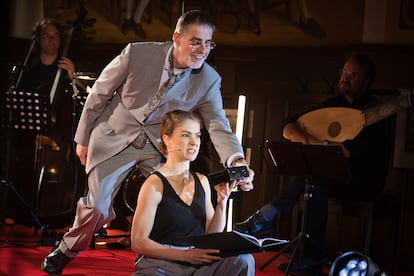
When Faust is with the spaniel who later turns out to be Mephistopheles, the bass aria from Cantata BWV 40 anticipates his presence with the mention of an “infernal serpent.” References to the devil are not lacking, of course, in Bach’s cantatas, just as allusions to sin are frequent, two omnipresent elements in the Lutheran texts the composer set to music. When Mephistopheles congratulates himself on the pact he has just made with Faust and congratulates him on the new direction his life is taking, the chosen music (the contralto aria from Cantata BWV 54) sounds almost like an ominous admonition: “Resist sin, or its poison will seize you. Do not let Satan dazzle you.” Equally eloquent is the use of the symphony's Cantata BWV 21 (“I had great affliction in my heart,” is sung in the subsequent fugal chorus) and the duet for alto and tenor (“O child of mankind, quickly cease to love sin and the world, lest the pain [of hell], where there will be howling and gnashing of teeth, afflict you forever”) as a prologue and epilogue, respectively, to Gretchen and Faust's fateful meeting in the street.
The moment when Gretchen tries on the jewels (here, a simple necklace) that Mephistopheles has left in her room is dazzling—never better said—. Gounod would also set this moment to music in his opera (and Bianca Castafiore would in turn make the protagonist's aria her own in The Adventures of Tintin ), but much more appropriate is the one chosen by Michael Maul when the adolescent Gretchen contemplates herself in the mirror and exclaims: “I am glorious, I am beautiful, to inflame my savior”—an aria sung by Alma in Cantata BWV 49 and which also originally has an additional obbligato part for oboe d'amore . In another cantata in which Alma and Jesus also converse, BWV 140, Maul takes the liberty of replacing “Jesu” with “Heinrich” (Faust’s name in Goethe’s tragedy) and “Seele” (soul) with “Gretchen” in the garden scene, a sacrilege certainly for the purists, but which in Auerbach’s tavern was perceived as a magnificent theatrical license (earlier, in the trio from Cantata BWV 38 played in the study scene, the first person of the original had been changed to the second so that he could address Faust directly: “ your tribulation”, “ your salvation”, “he will rescue you ”).
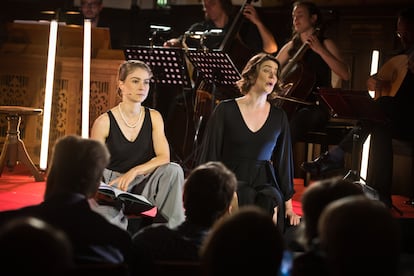
Gretchen’s prayer to the Mater Dolorosa is accompanied by a stanza from the songs of Schemelli’s Book (changing “sinner” to “sinneress”), while a chorale from the Orgelbüchlein and Cantata BWV 18 illustrates the encounter of the now lost Margaret with the Evil Spirit: “By the fall of Adam, nature and man have been completely corrupted; we have inherited the same poison.” The same idea is reinforced by another stanza from this hymn, borrowing music from the final chorus of Cantata BWV 109: “Man is wicked and cursed; his salvation is still far off.” And finally, the sequence of successes from the last two scenes is missing: in the middle of the dialogue between Faust and Mephistopheles, the tenor sings the aria “Ach mein Sinn” from the St. John Passion (“Oh, my soul, where will you finally go, where I will find relief? (…) In the world there is no escape, and in the heart live the sorrows of my evil deeds, because the servant has denied his Master”); and a bass recitative from Cantata BWV 24: “Hypocrisy is a child that Belial raised,” referring to Satan/Mephistopheles. Already in the prison where Margaret is imprisoned, the soprano sings an aria from Cantata BWV 114: “Where will there be a refuge for my spirit in this vale of tears?” And the allusion to his judgment comes from the opening chorus of Cantata BWV 105, one of the most extraordinary that Bach composed, almost in the manner of a prelude and fugue. Over the instrumental introduction of the first part of the chorus ("Lord, do not enter into judgment with your servant") rises the final exclamation of Mephistopheles ("Justice has been done!" not "He is condemned!" as it is read in some translations), and then the four singers attack the fugue ("For before you no one living will be just") before the concluding chorale of Cantata BWV 90 bids farewell to a Margaret whom we know has been saved thanks to a voice from heaven. Goethe's poetry and Bach's music complement and enrich each other: from beginning to end.
After lunch or dinner (there were performances at midday and mid-afternoon), the audience sat in chairs arranged in the central nave of the restaurant, with a small stage in the background. Instrumentalists and singers sat either behind the audience or on the small platform. The actors seemed trained to practice the Brechtian distancing effect, barely acting and even reading their verses so that words took precedence over action. Lea Ruckpaul, with her adolescent appearance, seemed born to embody Gretchen, and her crystalline German diction is pure music. Frank Arnold was more Mephistophelean than Burghart Klaubner—very attentive to his roles—was Faustian, but the limited space didn't allow for great theatrical displays. The Collegium Lipsiensis played adequately, below the level shown by the four singers, with obligatory praise for the subtle soprano Viola Blache and the enthusiastic tenor Daniel Johannsen, also excellent performers in the tavern scene. Contralto Susanne Langner and bass Felix Schwandtke performed at a somewhat lower level. Overall, as a practical performance, there were significant areas that could be improved, which would undoubtedly be polished with more experience, but as a musical-theatrical concept, the daring proposal is unbeatable. Unfortunately, it fell short: an hour longer would have been more than welcome by many of those present on Tuesday at the historic Lipsian tavern.
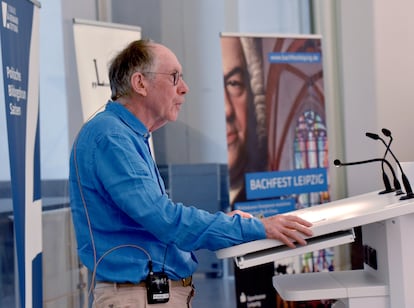
There was also literature at the Paulinum, the university church, this weekend, albeit of a different kind. Initially, two Nobel Prize winners (Herta Müller and J.M. Coetzee) were scheduled to speak about Bach ( Über Bach is the name of the series), but they were ultimately unable to travel to Leipzig. As planned, the British pianist Ian McEwan did attend, demonstrating his extensive knowledge of the composer and choosing his arguably most novelistic episode—his supposed journey on foot from Arnstadt to hear Dieterich Buxtehude perform in Lübeck—to speak about the profound transformation that what he called a true Winterreise brought about in the young Bach . He himself chose the examples from the music played on piano by the young Czech pianist Jan Čmejla, winner of this year's Bach Competition here in Leipzig. This session was much more entertaining and enjoyable than that of Israeli philosopher Omri Boehm, a professor at the New School for Social Research in New York, who pushed the envelope and spoke more about Ludwig Wittgenstein, Walter Benjamin, and Theodor Adorno than about Bach, who was mentioned almost casually at the end.
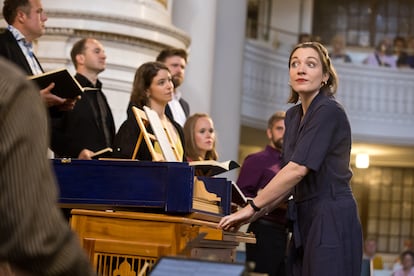
Four hours after her fourth performance of Faust , on Tuesday evening, Viola Blache sang again at the Nikolaikirche, and again in another experiment in line with the motto of this year's festival: Transformation . Elina Albach presented a Mass in B minor. transformed, renamed Missa Miniatura. With only six singers and eight instrumentalists, we heard a doubly reduced version of the only Bach work to set all five sections of the Ordinary of the Catholic Mass to music, as several sections were omitted and the composition originally conceived by the German composer was drastically reduced. Curiously, it was a Mass without oboes, trumpets, or violas, with only a violin and a cello. Instead, a cornetto (its virtuoso interpreter, Anna Schall, also played the recorder) and an electric guitar were added, which never stood out or was out of tune with its companions thanks to minimal amplification and the expertise of Bertram Burkert.
As soon as the opening Kyrie (one of Bach's greatest contrapuntal constructions) began, it was inevitable to recall Joshua Rifkin, the American musicologist who debunked the myth of the inexcusable presence of a choir to perform Bach's vocal works and who led by example by publishing the first non-choral version of the Mass in B minor in 1982. The proposal only works, of course, if you have top-notch singers and instrumentalists and a lucid guiding mind. Elina Albach has a wealth of Bachian experience and was one of the three performers of the unforgettable Johannespassion à trois. which was heard here three years ago in the open air on the Marktplatz. All of his instrumental choices are clever and often surprising, shattering all possible expectations: replacing the violin with the viola da gamba in “Laudamus te,” the traverso with the violin as an obbligato instrument in “Domine Deus,” the oboe d'amore with the cornetto in “Qui sedes,” the corno da caccia with the traverso and violin in “Quoniam tu solus sanctus,” or using the violin and electric guitar in unison for the final “Agnus Dei.”
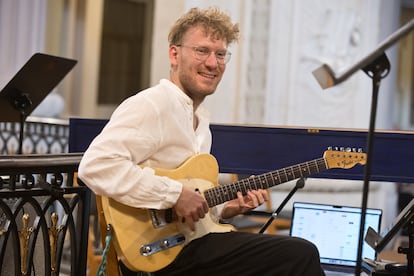
Everything makes sense, and everything sounds unmistakably Bach, a more transparent, pure Bach. The "Crucifixus" sounded especially sharp and angular; the transition from the "Confiteor" to the "Et expecto resurrectionem mortuorum" was agogically extraordinary, as was the growing dynamic approach to the final "Dona nobis pacem." It's difficult to single anyone out in a very compact performance, but the two sopranos (Marie Luise Werneburg, who had already sung as a soloist in the two John Eliot Gardiner concertos , and Viola Blache) and the countertenor Alex Potter (better solo, as in the "Agnus Dei," than in the group passages) stood out among the singers. Anna Schall played with ease passages that seem impossible to handle with a cornetto , Liam Byrne and Daniel Rosin were an ever-flexible bastion of continuo, and Albach herself, alternating between harpsichord and organ, made us forget all the omissions in an outpouring of faith and enthusiasm. Thomas Halle read several despairing texts by the Swiss composer Jürg Halter, which expressed in the first person doubts and disbelief in the face of the horrors of the world. His sardonic farewell, instead of the traditional "You may go in peace," was "I want to see you all laughing in peace." Hopefully, this Missa Miniature will one day grow and, based on the same premises, allow us to hear the complete Mass in B minor, with its 23 sections.
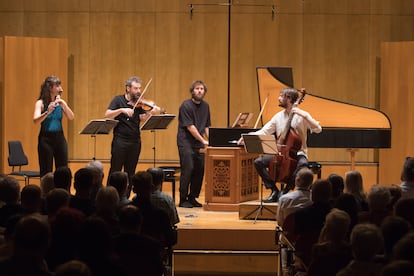
Shortly before that, that same afternoon, the French group Nevermind had played in the Gewandhaus's chamber hall their personal recreation of the so-called Goldberg Variations , another great Bach work, sifted here through a transformative sieve. For almost two hours, Anna Besson ( traverso ), Louis Creac'h (violin), Robin Pharo (viola da gamba), and Jean Rondeau (harpsichord and organ) transformed the fourth part of Bach's Clavier-Übung into a riot of mutual complicity and, above all, into a profoundly melancholic composition, as is, in its own way, The Art of Fugue . All the decisions taken jointly to bring about this radical metamorphosis (a tenth-anniversary gift to himself) were musically congruent. Small, almost constant liberties are permitted, such as octave changes or, of course, added voices, but the distribution or interchange of the notes Bach wrote is a display of ingenuity. Everything sounds so natural that, heard by someone unfamiliar with the original, they would never suspect that it wasn't originally a work conceived for this instrumental combination. The tacet notes are distributed among the four instruments, participating in an essentially democratic approach in which none of them wants to stand out. And in the repetition of the aria, with the melody entrusted to the flute as at the beginning, the violin doubles it in the repetitions, and the whole piece grows in density and intensity as a final farewell.
Without omitting a single repetition, they navigated the aria and its variations ("transformations" in the original title) with total mastery of their instruments. Besson controls the sound and intonation like few others; Creac'h is the closest thing to the ideal Baroque violinist; Pharo is the intellectual support of the group and the one who introduces the most nods to Buxtehude's chamber music; and Rondeau, who knows the work like no one else, harmonically completes the tapestry woven by his colleagues from harpsichord or organ. Furthermore, listening to performances like those discussed here on the same day or on consecutive days reinforces their value and the effect they produce, because they feed off each other. A festival cannot be a concentrated repetition of the same things heard throughout the year, dictated by a random agency. It must create new content, take risks, generate surprise and emotion, and invite reflection. The Bachfest does this every day, constantly transforming itself: to set an example.
EL PAÍS


%3Aformat(jpg)%3Aquality(99)%3Awatermark(f.elconfidencial.com%2Ffile%2Fbae%2Feea%2Ffde%2Fbaeeeafde1b3229287b0c008f7602058.png%2C0%2C275%2C1)%2Ff.elconfidencial.com%2Foriginal%2Ff31%2Fe93%2F624%2Ff31e93624aad7c7c6f9bdff301439eeb.jpg&w=1280&q=100)


